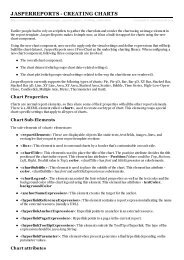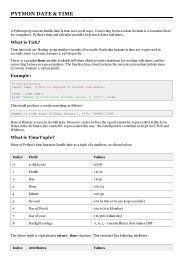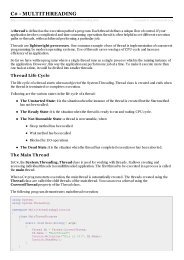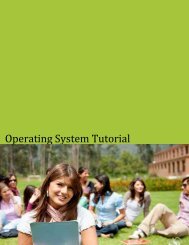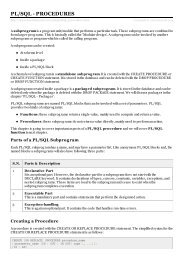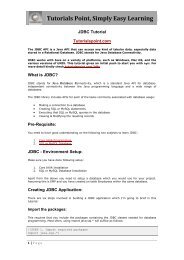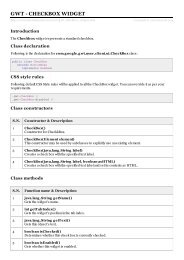download pascal tutorial (pdf - Tutorials Point
download pascal tutorial (pdf - Tutorials Point
download pascal tutorial (pdf - Tutorials Point
Create successful ePaper yourself
Turn your PDF publications into a flip-book with our unique Google optimized e-Paper software.
Now, let us extend the program little more, let us create a procedure named display, which will<br />
have its own set of variables a, b and c and display their values, right from the program<br />
exLocal.<br />
program exLocal;<br />
var<br />
a, b, c: integer;<br />
procedure display;<br />
var<br />
a, b, c: integer;<br />
begin<br />
(* local variables *)<br />
a := 10;<br />
b := 20;<br />
c := a + b;<br />
writeln('Winthin the procedure display');<br />
writeln('value of a = ', a , ' b = ', b, ' and c = ', c);<br />
end;<br />
begin<br />
a:= 100;<br />
b:= 200;<br />
c:= a + b;<br />
writeln('Winthin the program exlocal');<br />
writeln('value of a = ', a , ' b = ', b, ' and c = ', c);<br />
display();<br />
end.<br />
When the above code is compiled and executed, it produces the following result:<br />
Within the program exlocal<br />
value of a = 100 b = 200 c = 300<br />
Within the procedure display<br />
value of a = 10 b = 20 c = 30<br />
Global Variables<br />
Global variables are defined outside of a function, usually on top of the program. The<br />
global variables will hold their value throughout the lifetime of your program and they can<br />
be accessed inside any of the functions defined for the program.<br />
A global variable can be accessed by any function. That is, a global variable is available<br />
for use throughout your entire program after its declaration. Following is an example using<br />
global and local variables:<br />
TUTORIALS POINT<br />
Simply Easy Learning Page 71



